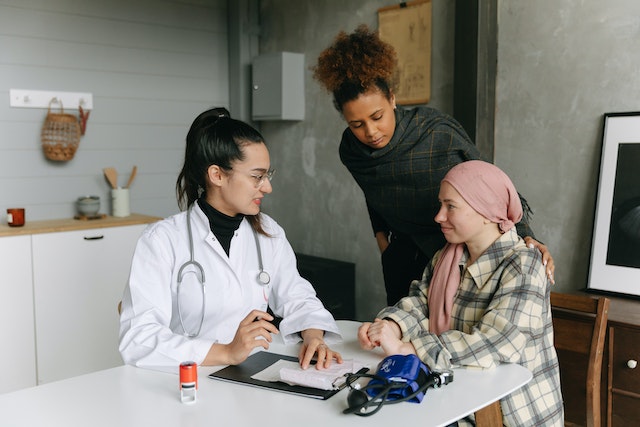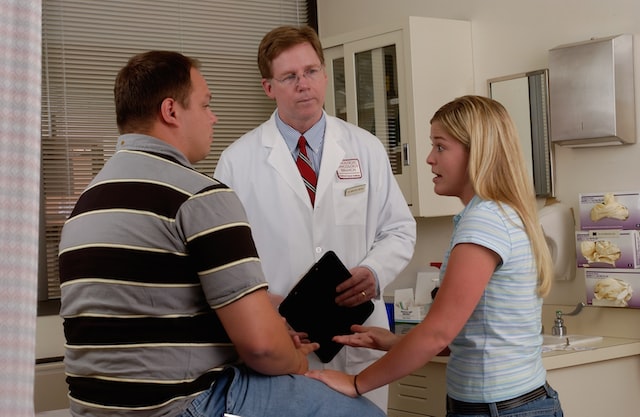By Jassica Mendez
A person battling cancer greatly benefits from the love and encouragement of family and friends during treatment and recovery. However, even with the best intentions, we don’t always have the right things to say to patients dealing with the mental and physical toll of cancer. Here are some suggestions on how you might offer your support.
Tips to help you support your loved one going through cancer therapy
To get your creative juices flowing, here are a few suggestions to help you support your loved one going through cancer therapy. As you read, you may come up with more that would be even more meaningful to your loved one.

However, don’t beat yourself up if you discover that you have neglected some of these. If you’re feeling guilty, just remember that you, too, are experiencing a roller coaster of emotions. You’ve probably even researched different health tips or perhaps even booked your next check-up.
These are all normal reactions; the best thing you can do for yourself is process what you are feeling. Now let’s see how to be there for your loved one going through the biggest battle of their life.
#1 Prepare yourself
Whether your loved one has just been diagnosed or they’re already receiving treatment, if this is your first time visiting them, you might be feeling anxious and nervous. It’s essential to prepare and avoid any awkward situations. Here are some things to keep in mind:
- Take time to process your emotions and feelings. Getting the alarming diagnosis that your loved one has cancer can be devastating. You might even start rethinking your life choices and looking to get a new medical insurance plan. So before visiting your loved one, give yourself time to process your feelings about the diagnosis.
- Find out what the doctor has said. Perhaps there are several reasons why your loved one doesn’t want to elaborate. Reiterating the same information to multiple audiences can be mentally and emotionally draining. Maybe their better half or a common acquaintance can fill you in on the basics.
- Consider your loved ones’ perspective. Think back on a time when you were so terrified you felt physically ill. Imagine how it was to be there. Cancer and its treatment can cause patients to feel exhausted, lose weight, and experience hair loss. The first thing you should say when you see someone is, “It’s lovely to see you,” rather than remarking on how much they’ve changed.
#2 Offer to accompany your loved one to their appointments
One of the numerous ways to show you care is by accompanying a loved one to their doctor’s appointments. Fear and long wait times are everyday experiences in healthcare facilities. Also, make sure you remember to bring a notepad. Don’t be afraid to engage in questioning, and be sure to take notes. Keep in mind that giving your loved one space to make their own choices is important.

#3 Ask what you can do to help
Those with cancer have to continue with their lives while rushing to and from treatment and dealing with irritating side symptoms like cancer-related fatigue. Cancer doesn’t spare them from paying bills or rent or keeping their place clean and tidy. So why not ask your loved ones what you can do to help them?
For example, they might need assistance making their living space more accessible. Therefore, you can offer to help with home decluttering. Don’t forget to clear all the pathways and, if needed, rotate the furniture to make their room more functional. They’ll surely appreciate having everything sorted so they can focus on getting better and recuperating from their treatment.
#4 Respect their need for privacy
It’s possible that when our loved ones with cancer say they want to be left alone, they are just trying to avoid bothering us. In other cases, they might be doing just the opposite. Therefore, make sure to observe your loved one with other visitors. Do they feel obligated to keep guests entertained because they don’t want to insult them by telling them to leave? If so, thank them for coming and softly mention that your loved one seems sleepy.

What not to do in order to support your loved one going through cancer therapy
Given that cancer is such a sensitive subject, people can often struggle to decide what’s appropriate and how to interact with their friend or a family member that’s going through it. To make this easier for you, here are the things you should absolutely avoid doing when trying to support your loved one going through cancer therapy:
- Don’t blame them for it. It’s crucial not to make the patient feel guilty or responsible for their disease or prognosis. For instance, if someone has lung cancer and has smoked for most of their life, now is not the time to criticize them for making a choice that may have led to their illness.
- Don’t define them by their diagnosis. When a diagnosis is treated as the person’s primary identifier, they can feel trapped and despondent. It’s important to remember that they’re still a person, despite their disease.
- Don’t just assume they’re helpless.
- Remove the stigma. Don’t turn your back on a loved one just because they have a stigmatized sickness. Now, more than ever, they need your help.
- Make them feel included. Don’t exclude your sick loved one from events or presume they don’t want to participate because of their illness. Keep asking them to events and gatherings, even if they express discomfort about experiencing due to the outward signs of their illness.
- Extend (some) grace to them. Your loved one may be under a lot of stress, and they may be taking medicine or participating in other interventions that alter their hormone levels. Allow them some slack in light of their current situation. Their mood could be low, and they might not act like they acted before the diagnosis.
Going through cancer therapy will be easier if your loved one knows they have your support!
We hope these tips help you support your loved one going through cancer therapy. We also want to take this opportunity to emphasize the importance of regular check-ups with your physician. You should also make sure to have a proper life and health insurance plan in place. That way, you’ll have peace of mind knowing you and your loved ones are secured.
